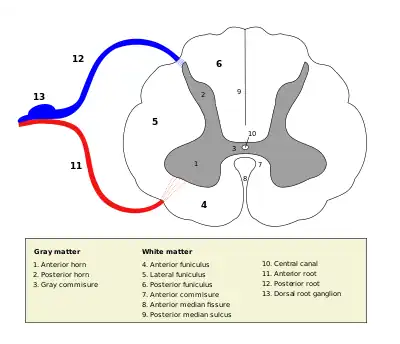Lateral funiculus
| Lateral funiculus | |
|---|---|
 | |
| Details | |
| Identifiers | |
| Latin | funiculus lateralis medullae spinalis |
| TA98 | A14.1.02.215 A14.1.04.007 |
| TA2 | 6093 |
| FMA | 74000 |
| Anatomical terminology | |
The most lateral of the bundles of the anterior nerve roots is generally taken as a dividing line that separates the anterolateral system into two parts. These are the anterior funiculus, between the anterior median fissure and the most lateral of the anterior nerve roots, and the lateral funiculus (or lateral column[1]) between the exit of these roots and the posterolateral sulcus.
The lateral funiculus transmits the contralateral corticospinal and spinothalamic tracts. A lateral cutting of the spinal cord results in the transection of both ipsilateral posterior column and lateral funiculus and this produces Brown-Séquard syndrome.[2]
References
![]() This article incorporates text in the public domain from page 753 of the 20th edition of Gray's Anatomy (1918)
This article incorporates text in the public domain from page 753 of the 20th edition of Gray's Anatomy (1918)
- ↑ "Posterior Funiculus - an overview | ScienceDirect Topics". www.sciencedirect.com. Retrieved 2021-05-21.
- ↑ Kaplan Qbook - USMLE Step 1 - 5th edition - page